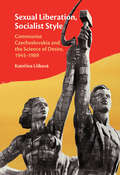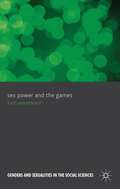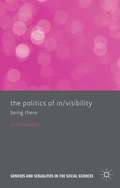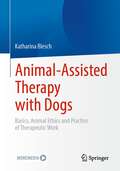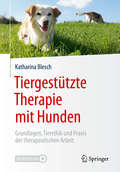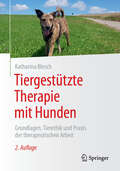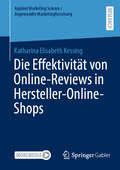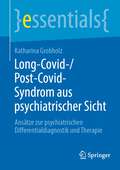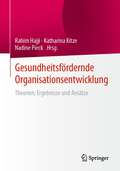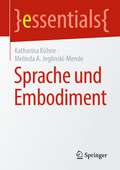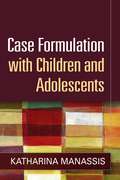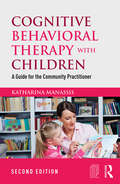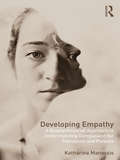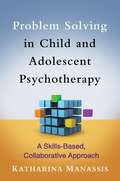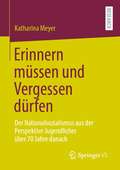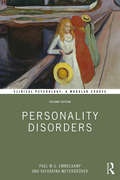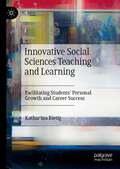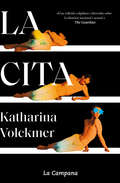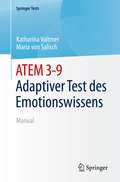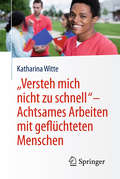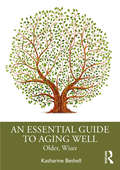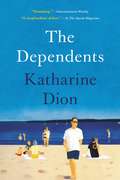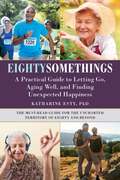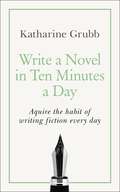- Table View
- List View
Sexual Liberation, Socialist Style: Communist Czechoslovakia and the Science of Desire, 1945–1989
by Kateřina LiškováThis is the first account of sexual liberation in Eastern Europe during the Cold War. Kateřina Lišková reveals how, in the case of Czechoslovakia, important aspects of sexuality were already liberated during the 1950s – abortion was legalized, homosexuality decriminalized, the female orgasm came into experts’ focus – and all that was underscored by an emphasis on gender equality. However, with the coming of Normalization, gender discourses reversed and women were to aspire to be caring mothers and docile wives. Good sex was to cement a lasting marriage and family. In contrast to the usual Western accounts highlighting the importance of social movements to sexual and gender freedom, here we discover, through the analysis of rich archival sources covering forty years of state socialism in Czechoslovakia, how experts, including sexologists, demographers and psychologists, advised the state on population development, marriage and the family to shape the most intimate aspects of people’s lives.
Sex Power and the Games
by Kath WoodwardThis book explores the social and cultural impact of the Olympic Games, examining gender and sport, the inequalities between nations and people and at what the Games offer and how they are changing, in relation to spectacles, spectatorship and culture, including the links between art and sport.
The Politics of In/Visibility: Being There (Genders and Sexualities in the Social Sciences)
by Kath WoodwardThe Politics of In/Visibility.
Animal-Assisted Therapy with Dogs: Basics, Animal Ethics and Practice of Therapeutic Work
by Katharina BleschAnimal-assisted therapy has been the talk of the town for several years and is increasingly being integrated into the psychotherapeutic treatment of people. But how exactly can dogs support psychotherapeutic work? How can animal welfare and human welfare be combined? Which dogs are suitable and how are they prepared? This book provides a practical and lively insight into therapeutic work with dogs. In addition to an overview of the basics as well as animal welfare and ethical aspects of dog-assisted therapy, concrete exercises in the context of dog-assisted self-confidence training are described pictorially and by video, providing inspiration for therapeutic work in various institutions and situations.
Tiergestützte Therapie mit Hunden: Grundlagen, Tierethik und Praxis der therapeutischen Arbeit
by Katharina BleschDie tiergestützte Therapie ist seit einigen Jahren in aller Munde und wird immer häufiger auch in die psychotherapeutische Behandlung von Menschen integriert. Doch wie genau können Therapiebegleithunde die psychotherapeutische Arbeit erweitern und unterstützen? Wie lassen sich dabei Tierschutz und Menschenwohl vereinen? Welche Hunde eignen sich für den Einsatz als Therapiebegleithund und wie werden sie auf ihren Einsatz vorbereitet?Mit diesem Fachbuch erhalten Sie einen praxisnahen und lebendigen Einblick in die therapeutische Arbeit mit Hunden. Neben einem Überblick über die Grundlagen sowie tierschutzrechtliche und ethische Aspekte der hundegestützten Therapie von Menschen werden konkrete Übungen im Rahmen eines hundegestützten Selbstsicherheitstrainings bildhaft und per Video beschrieben und geben so Inspiration für die therapeutische Arbeit mit Mensch und Tier in verschiedenen Institutionen und Situationen.
Tiergestützte Therapie mit Hunden: Grundlagen, Tierethik und Praxis der therapeutischen Arbeit
by Katharina BleschDie tiergestützte Therapie ist seit einigen Jahren in aller Munde und wird immer häufiger auch in die psychotherapeutische Behandlung von Menschen integriert. Doch wie genau können Therapiebegleithunde die psychotherapeutische Arbeit erweitern und unterstützen? Wie lassen sich dabei Tierschutz und Menschenwohl vereinen? Welche Hunde eignen sich für den Einsatz als Therapiebegleithund und wie werden sie auf ihren Einsatz vorbereitet? Mit diesem Fachbuch erhalten Sie einen praxisnahen und lebendigen Einblick in die therapeutische Arbeit mit Hunden. Neben einem Überblick über die Grundlagen sowie tierschutzrechtliche und ethische Aspekte der hundegestützten Therapie von Menschen werden konkrete Übungen im Rahmen eines hundegestützten Selbstsicherheitstrainings bildhaft und per Video beschrieben und geben so Inspiration für die therapeutische Arbeit mit Mensch und Tier in verschiedenen Institutionen und Situationen.
Die Effektivität von Online-Reviews in Hersteller-Online-Shops (Applied Marketing Science / Angewandte Marketingforschung)
by Katharina Elisabeth KessingOnline-Bewertungen können Einzelhändlern helfen, die Unsicherheit der Kunden vor dem Kauf zu verringern, die Conversion-Rate zu erhöhen und den Umsatz zu steigern. Aber gelten diese Vorteile auch für Hersteller und ihre eigenen Online-Shops? Auf der Grundlage sozialpsychologischer Theorien und sechs experimenteller Studien untersucht Katharina Kessing die unterschiedliche Effektivität von Online-Reviews in Hersteller- und Händler-Online-Shops und identifiziert dabei zwei gegensätzliche Effekte: Online-Reviews, die in Hersteller-Online-Shops veröffentlicht werden, werden tendenziell als manipuliert wahrgenommen, sodass Kunden dem Hersteller ein größeres kommerzielles Interesse unterstellen. Dies wirkt sich wiederum negativ auf die Kaufabsicht aus. Zweitens können Online-Reviews das Gefühl der Dankbarkeit der Kunden gegenüber dem Online-Shop verstärken, was ihre Kaufabsichten steigert. Abschließend werden zwei effektive Strategien zur Reduktion der schädlichen Auswirkungen von Online-Reviews im Hersteller-Online-Shop vorgestellt: unabhängige Quellen und multidimensionale Ratings. Die Ergebnisse können Herstellern bei der Entscheidung helfen, ob und wie sie Online-Reviews in ihren eigenen Online-Shops veröffentlichen sollten.
Long-Covid-/Post-Covid-Syndrom aus psychiatrischer Sicht: Ansätze zur psychiatrischen Differentialdiagnostik und Therapie (essentials)
by Katharina GrobholzDer Pathomechanismus von Long-/Post-Covid ist noch nicht endgültig geklärt, in ihrer Wirksamkeit ausreichend erprobte bzw. kurative Therapien stehen bisher nicht zur Verfügung.Die Differentialdiagnose zu psychischen Erkrankungen ist aufgrund der unspezifischen Symptomatik sowie des hohen Anteils psychischer Komorbiditäten oft schwierig. Psychiatrische und therapeutische Expertise sollte deshalb als Bestandteil der Diagnostik und des symptomatischen, interdisziplinären Behandlungskonzept bedacht werden. In diesem essential werden Diagnosekriterien, Möglichkeiten zur psychiatrischen Differentialdiagnostik sowie Ansatzpunkte zur psychotherapeutischen Behandlung bei Long-/Post-Covid dargestellt.
Gesundheitsfördernde Organisationsentwicklung: Theorien, Ergebnisse und Ansätze
by Rahim Hajji Katharina Kitze Nadine PieckDas Buch geht der Frage nach, wie gesundheitsfördernde Organisationsentwicklung aus verschiedenen Perspektiven konzipiert und realisiert werden kann. Es werden differenzierte Ansätze, theoretische Zugänge, empirische Ergebnisse, Interventionen und Methoden mit dem Blick auf Gesundheit in Organisationen vorgestellt. Es beschäftigt sich unter anderem mit den Fragen: Wie kann die gesundheitsfördernde Organisationsentwicklung aus verschiedenen Perspektiven beschrieben werden? Wie sieht Personalentwicklung unter Berücksichtigung der gesundheitsfördernden Organisationentwicklung aus? Welche Ursachen, Formen und Praktiken von betrieblichem Gesundheitsmanagement gibt es aus Sicht einer gesundheitsfördernden Organisationsentwicklung? Wie sehen die gesundheitlichen Belastungen und Beanspruchungsfolgen in Unternehmen aus? Welche rechtlichen Rahmenbedingungen existieren für das betriebliche Eingliederungsmanagement bei der Gestaltung gesundheitsfördernder Organisationen? Welches Führungsverständnis und Führungsverhalten ist im Kontext einer gesundheitsfördernden Organisationsentwicklung nötig? Welche Implikationen für die gesundheitsfördernde Organisationsentwicklung entstehen aus der agilen Organisationsentwicklung?
Sprache und Embodiment (essentials)
by Katharina Kühne Melinda A. Jeglinski-MendeJahrelang haben Wissenschaftler gedacht, dass wir die gesamte Palette des menschlichen Handelns und Denkens einem einzigen Organ – dem Gehirn – verdanken. Diese Annahmen werden allerdings mehr und mehr zu Gunsten des sogenannten Embodiments ergänzt: Ein Ansatz, der besagt, dass der Körper mit dem Geist/Gehirn als eine Einheit fungiert. In diesem Buch bringen wir Hinweise für verkörperte Sprache zusammen und erläutern, wie die Ergebnisse aus wissenschaftlichen Studien im alltäglichen Leben, wie zum Beispiel im Schulunterricht oder in der Klinik, anwendbar sind.
Case Formulation with Children and Adolescents
by Katharina ManassisHighly practical and accessible, this book shows how to synthesize complex information about child and adolescent mental health problems into clinically useful, dynamic case formulations. Strategies and tools are provided for analyzing the biological, psychological, social, cultural, spiritual, and developmental factors that may be contributing to the difficulties of clients ages 4-18. Numerous case examples illustrate the steps in crafting a comprehensive formulation and using it to plan effective, individualized treatment. Strategies for overcoming frequently encountered pitfalls in case formulation are highlighted throughout.
Cognitive Behavioral Therapy with Children: A Guide for the Community Practitioner
by Katharina ManassisThis new edition of Cognitive Behavioral Therapy with Children links together the methods of cognitive behavioral therapy (CBT) practiced in academic centers as well as the community. This book addresses the challenges community practitioners face when pressured to use CBT with youth who live with mental health disorders, but whose circumstances differ from those in research settings. Practitioners will learn how to overcome therapeutic obstacles. This new edition contains an expanded discussion on cultural considerations relevant to assessment and treatment, as well as a new chapter on training others in CBT for children.
Developing Empathy: A Biopsychosocial Approach to Understanding Compassion for Therapists and Parents
by Katharina ManassisEmpathy is valued across cultures, and has a profound impact on psychotherapy, our children, and our world. Why then are many human relationships not empathetic? This volume describes in detail the neurobiological, psychological, and social elements involved with empathy. Ideas are brought to life with case examples and reflective questions which help the reader learn ways to overcome empathetic barriers. The book shows how fear, anger, and anxiety all take away the power to feel for others, while also looking at the topic through a global lens. Developing Empathy is an easy-read book, backed by science, useful to the clinician, and to all readers interested in the topic.
Problem Solving in Child and Adolescent Psychotherapy
by Katharina ManassisThis highly accessible book presents clear steps for helping children and adolescents to develop and test out new solutions to specific social, emotional, or behavioral challenges. The author demonstrates how therapists of any orientation can implement problem solving as a stand-alone intervention or in combination with other therapeutic techniques. Extensive clinical examples illustrate what the approach looks like in action with kids of different ages; how it increases their confidence, independence, and resilience; and ways to involve parents. Strategies for overcoming frequently encountered obstacles to problem solving are highlighted throughout.
Erinnern müssen und Vergessen dürfen: Der Nationalsozialismus aus der Perspektive Jugendlicher über 70 Jahre danach
by Katharina MeyerMehr als 70 Jahre nach dem Ende des Nationalsozialismus prägt die wachsende zeitliche Distanz zum historischen Geschehen die Auseinandersetzung mit diesem. Veränderte familiäre Bezüge, der Abschied von Zeitzeug*innen und gegenwärtige gesellschaftliche Diskurse nehmen Einfluss auf die Perspektiven Jugendlicher. Dies wirft eine Vielzahl von Fragen auf: Wie beschäftigen sich junge Menschen in Deutschland mehr als sieben Jahrzehnte nach dem Holocaust mit dem Thema? Welche Relevanz hat der Nationalsozialismus für sie, welche geschichtlichen Vorstellungen von der Zeit haben sie und wie erleben sie den Umgang damit in Deutschland? Die Studie geht diesen Fragen anhand des Gruppendiskussionsverfahrens und der Grounded Theory Methodologie empirisch nach, nimmt Kontinuitäten und Brüche in den Bezügen zum Nationalsozialismus in den Blick und zeigt Zusammenhänge zur Identifikation mit Deutschland auf.
Personality Disorders: Personality Disorders (Clinical Psychology: A Modular Course)
by Paul M. Emmelkamp Katharina MeyerbrökerThe new edition of Personality Disorders continues to provide an in-depth guide to personality disorders, assessment and treatment, across varied patient groups and settings. Grounded in scholarly review and illustrated with a diversity of case studies, this book covers familiar ground with comprehensive detail, including the description of personality disorders, diagnosis, epidemiology, aetiology and treatment strategies. Furthermore, this new edition reflects changes in the new ICD-11 and DSM-5, assessment instruments, and state-of-the-art insights from theory-driven research. Part of the popular ‘Clinical Psychology: A Modular Course’ series, Personality Disorders offers excellent coverage on all aspects of personality disorder, and will be extremely informative for students and practitioners alike.
Innovative Social Sciences Teaching and Learning: Facilitating Students' Personal Growth and Career Success
by Katharina RietigThis book offers novel insights into how students can develop a personal growth mindset during their degree programs that allows them to view new challenges as opportunity to grow personally, reflect on the new knowledge and experience, and subsequently improve their skills to critically examine and evaluate information in a journey of personal growth. Based on learning theories drawn from cognitive and social psychology and over 12 years of integrating the ‘personal growth mindset’ into course design, it offers a novel framework that allows higher education teachers to constructively align learning objectives and assessments with crucial transferable skill development, and fostering a mindset for personal growth among students that focuses on continuously improving and reflecting on feedback. The objective is to empower academics to build courses and degree programs that are ‘fit for purpose’ by equipping social science students with the skills and mindsets that will benefit them throughout their careers in ever changing and newly emerging jobs. The book will appeal to those who are interested in how individuals learn in educational settings and in the wider workplace.
La cita: O la història d’una polla jueva
by Katharina VolckmerUna novel·la provocadora i intimista que reflexiona sobre la identitat sexual i la condició humana. La Sarah, d'origen alemany, acudeix a la consulta del doctor Seligman per sotmetre's a una operació de canvi de sexe. Mentre el cirurgià, que és jueu, li examina la vagina, la Sarah li confessa les seves fantasies sexuals amb Hitler i un robot, i la vergonya que sent per haver nascut a Alemanya. "Quan era jove sempre pensava que l'única manera de superar de debò l'Holocaust era estimar un jueu", confessa al cirurgià. En un monòleg sarcàstic i punyent, la Sarah -des de la llitera del metge- reflexiona sobre la condició humana, el paper de la dona al segle XXI i el seu malestar pel fet d'haver nascut amb un sexe amb el qual no s'identifica. El doctor Seligman es converteix en el confessor silenciós dels seus temors i neguits. Katharina Volckmer debuta com a escriptora amb una novel·la provocadora, intimista i hilarant que manté la tensió literària a través d'un discurs sense tabús que pretén fer les paus amb un mateix i amb la història.
ATEM 3-9 Adaptiver Test des Emotionswissens: Manual (SpringerTests)
by Katharina Voltmer Maria von SalischSeit den ersten Tagen ihres Lebens erleben Kinder Emotionen: ihre eigenen und die ihrer eng vertrauten Mitmenschen. Das Wissen über die Emotionen anderer Menschen ist ein grundlegender Bestandteil in allen Modellen der emotionalen Kompetenz und eine wichtige Informationsquelle ist dabei, Emotionen in den Gesichtern anderer Menschen zu lesen. Zum Emotionswissen gehört auch das Erkennen externaler und internaler Gründe für das Erleben von Gefühlen, welche Konsequenzen dies hat und außerdem das Wissen über die verschiedenen Möglichkeiten der Emotionsregulation. Die Entwicklung des Emotionswissens schreitet in den Vor- und Grundschuljahren rasant voran. Meta-Analysen zeigen, dass ein gut ausgebildetes Emotionswissen sowohl mit größeren sozialen Kompetenzen, höherer Peerakzeptanz und weniger internalisierendem und externalisierendem Problemverhalten zusammenhängt, als auch mit besseren schulischen Leistungen und positiverer Einstellung zur Schule. Eine valide Erfassung des Emotionswissen stellt die Weichen für gezielte Förderung und Interventionen im vorschulischen und schulischen Bereich.Der ATEM 3-9 ist ein Test des Emotionswissens für Kinder im Alter zwischen drei und neun Jahren. Der ATEM ist nach der Item-Response-Theorie aufgebaut und hat ein adaptives Design. Er umfasst sechs Komponenten: (1) das Erkennen von Emotionen in der Mimik anderer Menschen, (2) das Erkennen von Situationen als Emotionsauslösern, (3) das (Nicht-) Erfüllen von Wünschen als Emotionsauslöser, (4) gemischte Emotionen, (5) Überzeugungen als Emotionsauslöser, (6) Wissen über Ausdrucksregeln von Emotionen und (7) Wissen über Emotionsregulationsstrategien. In diesen Komponenten wird das Emotionswissen über die Emotionen Freude, Trauer, Ärger, Angst, Ekel und Überraschung abgefragt. Die Items des Tests sind in eine für Kinder ansprechend gestaltete Geschichte eingebettet und steigen in ihrer Schwierigkeit entsprechende der Entwicklung des Emotionswissens im Vor- und Grundschulalter an.
„Versteh mich nicht zu schnell“ – Achtsames Arbeiten mit geflüchteten Menschen
by Katharina WitteDieses Buch bietet Ehrenamtlichen und beruflich Tätigen im Arbeitsfeld geflüchteter Menschen wertvolles Orientierungs- und Beratungswissen für die Praxis. Der Leser profitiert von der langjährigen Erfahrung der Autorin als Supervisorin und von ihren unterschiedlichen Zugängen zum Kontext Flucht. Das Buch setzt sich mit der Angst vor dem Fremden auseinander, aber auch mit der Entdeckung des Fremden in uns selbst. Es soll Mut machen, Fragen zu stellen, und so Ängste in Neugier und Selbstbewusstsein umwandeln. Zahlreiche Fallbeispiele, Methoden und Wissensbausteine dienen als konkrete Arbeitshilfe und unterstützen bei der Reflexion der eigenen Arbeit.
Shakespearean Sensations
by Katharine A. Craik Tanya PollardThis strong and timely collection provides fresh insights into how Shakespeare's plays and poems were understood to affect bodies, minds and emotions. Contemporary criticism has had surprisingly little to say about the early modern period's investment in imagining literature's impact on feeling. Shakespearean Sensations brings together scholarship from a range of well-known and new voices to address this fundamental gap. The book includes a comprehensive introduction by Katharine A. Craik and Tanya Pollard and comprises three sections focusing on sensations aroused in the plays; sensations evoked in the playhouse; and sensations found in the imaginative space of the poems. With dedicated essays on Hamlet, Macbeth, Othello and Twelfth Night, the collection explores how seriously early modern writers took their relationship with their audiences and reveals new connections between early modern literary texts and the emotional and physiological experiences of theatregoers.
An Essential Guide to Aging Well: Older, Wiser
by Katharine BethellThis book is a refreshingly honest self-help guide to aging well. It encourages readers to dispel gloom or overcome denial around the subject of aging and offers advice in a realistic, non-prescriptive format. Practical yet personable, chapters move through pertinent topics such as making the decision to retire and successfully navigating that transition; designing daily routines (your practice) and engaging in activities (your projects); connecting with others as relationships shift and evolve; and managing moods and emotional issues. The guide also supports readers coping with illness or injury, experiencing loss and grief, and those searching for meaning as they grow older. Written in a conversational style, An Essential Guide to Aging Well motivates its readers to be curious about this time of life, and to design the best possible version of it for themselves.
The Dependents
by Katharine DionOne of TIME magazine's best summer reads, a "wise" (Entertainment Weekly) and "resplendent" (O, The Oprah Magazine) debut that follows a new widower confronting the truth about his long marriageOne of the best books of the summer: TIME, Entertainment Weekly, O: The Oprah Magazine, Real Simple, Brit + Co."A fine debut, full of intelligent writing . . . This book pleases on many levels." --Jeffrey Eugenides"The Dependents is a big book, one that grapples with important questions through generations...Dion's intelligence and ambition truly shine through sentence after sentence." --Kate Walbert, National Book Award finalist and author of A Short History of WomenAfter the sudden death of his wife, Maida, Gene is haunted by the fear that their marriage was not all it appeared to be. Alongside Ed and Gayle Donnelly, friends since college days, he tries to resurrect happy memories of the times the two couples shared, raising their children in a small New Hampshire town and vacationing together at a lake house every summer. Meanwhile, his daughter, Dary, challenges not only his happy version of the past but also his view of Maida. As a long-standing rift between them deepens, Gene starts to understand how unknown his daughter is to him--and how enigmatic his wife was as well. And a lingering suspicion seizes his mind that could upend everything he thought he knew. Katharine Dion's assured debut moves seamlessly between Gene's present-day journey and the long history of a marriage and friendship. Rich and wonderfully alive, The Dependents is the most moving kind of drama, an intimate glance into the expanse of family life and the way we must all eventually bridge the chasm between what we want to believe and what we know to be true.
Eightysomethings: A Practical Guide to Letting Go, Aging Well, and Finding Unexpected Happiness
by Katharine EstyThis invaluable guide will help the historical number of eightysomethings live fulfilled, happy lives long into their twilight years. Old age is not what it used to be. For the first time ever, most people in the United States are living into their eighties. The first guide of its kind, Eightysomethings changes our understanding of old age with an upbeat and emotionally savvy view of the uncharted territory of the last stage of life. With insight and humor, Dr. Katharine Esty describes the series of dramatic and difficult transitions that eightysomethings usually experience and how, despite their losses, they so often find themselves unexpectedly happy. Living into one’s eighties doesn’t have to mean declining health and loneliness: Dr. Esty shows readers how to embrace—and thrive during—the later stages of life. Based on her more than 120 interviews around the country, Esty explores the lives of ordinary eightysomethings—their attitudes, activities, secrets, worries, purposes, and joys. Their stories illustrate how real people in their eighties are living and how they make sense of their lives. Esty adds her wisdom and perspective to this multi-dimensional look at being old as a social psychologist, a practicing psychotherapist, and as an eighty-four-year-old widow living in a retirement community.Eightysomethings is a must-read for people in their eighties, and also for their families. Adult children—often bewildered by their aging parents—need a wise guide like Eightysomethings to help them navigate their parents’ last stage of life with real-world guidelines and conversation starters. Readers, young and old alike, will find this first-of-its-kind book eye-opening, comforting, and filled with practical tips.
Write a Novel in 10 Minutes a Day: Acquire the habit of writing fiction every day
by Katharine GrubbLEARN HOW TO WRITE FICTION BY WRITING EVERY DAYWould you like to write but have no spare time?Do you not know where to begin?Write A Novel In 10 Minutes A Day will help you sculpt a full-length piece of creative writing in just ten minutes a day. Starting with a daily practical exercise, it will help you manage your writing schedule within this time frame and help you bring your novel to life. You will be able to clarify your vision and review your time commitments, as well as understand your own abilities. Learning to observe the world around you, write quickly and tap into your unique voice will help you to create all the elements of your story and, by the time you've finished all the exercises, you'll have created something beautiful.ABOUT THE SERIESThe Teach Yourself Creative Writing series helps aspiring authors tell their story. Covering a range of genres from science fiction and romantic novels, to illustrated children's books and comedy, this series is packed with advice, exercises and tips for unlocking creativity and improving your writing. And because we know how daunting the blank page can be, we set up the Just Write online community at tyjustwrite, for budding authors and successful writers to connect and share.
